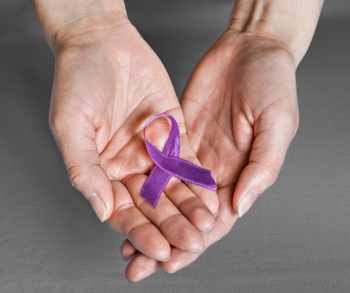Strength Through Support: How Home Care Assistance Helps Seniors Facing Pancreatic Cancer
November 7, 2025

Each November, Pancreatic Cancer Awareness Month brings much-needed attention to one of the most challenging cancers to diagnose and treat. For seniors, a pancreatic cancer diagnosis often changes daily life in an instant—introducing fatigue, pain, and uncertainty about what comes next. But even in the midst of difficulty, compassionate support can make an enormous difference.
That’s where home care assistance steps in. Professional caregivers help seniors manage daily routines safely and comfortably, allowing them to focus on rest, treatment, and time with loved ones. By providing physical help and emotional reassurance, home caregivers become an essential part of the journey—offering strength and stability when it’s needed most.
Understanding Pancreatic Cancer in Seniors
The pancreas plays a crucial role in digestion and regulating blood sugar, so when it’s affected by cancer, the body’s energy levels and appetite can change dramatically. Seniors undergoing treatment for pancreatic cancer may experience weight loss, nausea, weakness, and difficulty eating.
These challenges can make it difficult to maintain independence at home. Even small tasks—like preparing meals, bathing, or managing medications—can become overwhelming. That’s why having reliable home-based support is so valuable.
Caregivers offering home care assistance provide practical help with daily living, so seniors can conserve their energy for healing and emotional well-being.
The Importance of Comfort and Familiarity
Facing cancer is never easy, but being at home provides an undeniable sense of peace. The familiar sights, sounds, and smells of home can soothe anxiety and promote relaxation. Unlike hospitals, home allows seniors to keep their routines and remain close to family, friends, and pets.
Caregivers help preserve this comfort by creating a calm, safe environment. They keep the home tidy, prepare light meals, assist with mobility, and ensure medications are taken on schedule. Every action is guided by compassion and respect for the senior’s dignity.
Home becomes not just a place of care—but a source of strength and stability during an uncertain time.
Daily Living Support That Eases the Burden
When cancer treatment causes fatigue or weakness, everyday activities can feel impossible. Caregivers are trained to provide assistance while promoting independence as much as possible. Their support may include:
-
Meal preparation: preparing small, nutritious meals that meet dietary needs.
-
Personal care: helping with bathing, grooming, and dressing while maintaining privacy.
-
Mobility support: assisting with walking, transfers, and positioning to prevent falls or pressure sores.
-
Medication reminders: ensuring pain and nausea management routines are followed correctly.
-
Light housekeeping: maintaining cleanliness and comfort in living areas.
This hands-on help ensures seniors feel cared for and safe, while giving families peace of mind that their loved one’s daily needs are being met with compassion and skill.
Emotional Support: The Heart of Home Care
Cancer takes a toll on the body—but it also weighs heavily on the heart. Many seniors facing pancreatic cancer experience fear, sadness, or frustration as they navigate treatment and changing abilities. Emotional support is just as vital as physical care.
Caregivers bring more than practical help—they bring presence. A listening ear, shared laughter, or simply sitting together during a difficult moment can lift a senior’s spirits and reduce feelings of isolation.
Through home care assistance, companionship becomes a key part of healing. Having someone nearby who understands and cares deeply provides emotional steadiness during a time of uncertainty.
Helping Families Cope and Stay Involved
Family members often carry the emotional and logistical weight of a cancer diagnosis. Between doctor visits, medication schedules, and work responsibilities, exhaustion can quickly set in. Home caregivers help lighten that load by sharing responsibility and providing consistent, dependable care.
They can accompany seniors to appointments, communicate updates to family members, and ensure the home environment remains safe and organized. This collaboration allows families to focus on emotional connection—spending quality time with their loved one rather than being consumed by caregiving tasks.
By providing structure and support, caregivers make the entire experience less overwhelming for everyone involved.
Promoting Comfort During Treatment and Recovery
Treatment for pancreatic cancer often includes chemotherapy, surgery, or palliative therapies. Side effects can vary, but fatigue, loss of appetite, and digestive discomfort are common.
Caregivers help by offering small, practical comforts:
-
Keeping nutritious snacks nearby to encourage eating.
-
Adjusting pillows or blankets for comfort during rest.
-
Ensuring hydration and gentle movement to maintain circulation.
-
Providing transportation to and from appointments safely.
Even simple gestures—like making a cup of tea, adjusting lighting, or offering a steady arm—can make a profound difference in comfort and morale.
The Role of Compassion in Cancer Care
Compassion is at the core of every meaningful care relationship. It’s what turns routine tasks into moments of kindness and transforms fear into reassurance.
Caregivers who specialize in cancer support approach each day with empathy and patience. They understand that healing isn’t just physical—it’s emotional and spiritual too. Their quiet strength helps seniors and families feel grounded, even when life feels uncertain.
Home care assistance isn’t just about tasks—it’s about human connection, understanding, and the power of presence.
Recognizing Pancreatic Cancer Awareness Month
This Pancreatic Cancer Awareness Month, we honor the courage of seniors facing this difficult diagnosis—and the families and caregivers who stand beside them. Cancer care is a team effort built on compassion, trust, and resilience.
Home care assistance gives seniors the comfort and dignity they deserve, helping them live each day with as much ease and grace as possible. It allows families to find strength together, creating moments of peace in the midst of uncertainty.
At home, surrounded by care and love, healing isn’t just about fighting illness—it’s about cherishing the time and connections that matter most.
If you or your loved one is looking for Home Care Assistance in Campbell, CA, please call Familiar Surroundings Home Care.
Santa Clara County: (408) 979-9990
San Mateo County: (650) 353-9777
Santa Cruz County: (831) 480-3990


